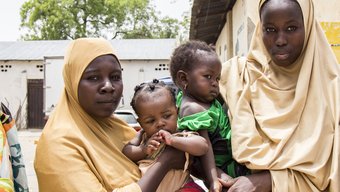Categories
Nigeria country profile
BACKGROUND
The Federal Republic of Nigeria is located along the inner corner of the Gulf of Guinea on the west coast of Africa. It is home to one of the world's largest river deltas, the Niger Delta, where the rivers Niger and the Benue converge. Nigeria has a varied landscape and is characterized by three distinct climate zones, a tropical monsoon climate in the south, a tropical savannah climate for most of the central regions, and a Sahelian hot and semi-arid climate in the north of the country.
Nigeria is a lower-middle-income country and has been the largest economy in Africa since 2012. With an abundance of natural resources, it is Africa's biggest oil exporter and has the largest natural gas reserves on the continent. It has high rates of deforestation, which in turn can exacerbate climate hazards.
Northern areas have a high degree of annual variation in their rainfall regime, which results in flooding and droughts. Overall, Nigeria is exposed to floods, epidemics, landslides, storms, and extreme temperatures.
INFORM RISK INDEX (2022)
Hazard and exposure: 7.3 | Vulnerability: 5.8 | Lack of coping capacity: 6.3 | Total: 6.4 (high) | Rank: 21
HAZARDS COVERED BY ANTICIPATION
Other (electoral violence) | Multi-hazard | Riverine floods | Epidemic
EXPERIENCE ON ANTICIPATION
- Nigeria Red Cross Society (NRCS) has been developing anticipatory actions ahead of epidemics, riverine floods, and multi-hazard shocks. With the help of IFRC, NRCS has developed a simplified Early Action Protocol (EAP) ahead of flooding impacts.
- Start Network has allocated funding to early action twice in Nigeria. In 2018, 120,774 people were reached in anticipation of electoral violence (alert 300). Recently, Start Network allocated £300,000 ahead of flooding in August 2022 (alert 629).


